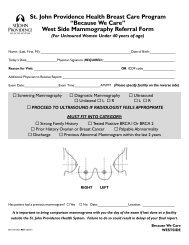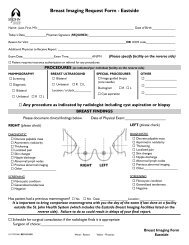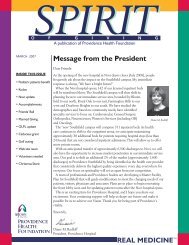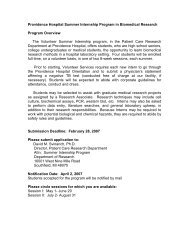Speak Up Brochure - St. John Health System
Speak Up Brochure - St. John Health System
Speak Up Brochure - St. John Health System
Create successful ePaper yourself
Turn your PDF publications into a flip-book with our unique Google optimized e-Paper software.
We're Committed to Patient Safety<br />
Welcome to <strong>St</strong>. <strong>John</strong> Macomb Hospital.<br />
We want you to know that our<br />
physicians and staff are committed<br />
to patient safety. We believe that<br />
patient safety can best be achieved<br />
when you actively participate in your<br />
care, working in partnership with<br />
your health care providers.<br />
Everyone has a role in making health<br />
care safe — physicians, health care<br />
executives, nurses and technicians. <strong>Health</strong><br />
care organizations across the country are<br />
working to make health care safety a<br />
priority. You, as the patient, can also play<br />
a vital role in making your care safe by<br />
becoming an active, involved and informed<br />
member of your health care team.<br />
To prevent<br />
health care errors,<br />
patients are<br />
urged to …<br />
Please take some time to read this<br />
brochure about how you can work with<br />
us to help prevent errors in your care.<br />
Thank you for choosing <strong>St</strong>. <strong>John</strong> Macomb<br />
Hospital to provide your health care.<br />
11800 E. Twelve Mile Road<br />
Warren, MI 48093<br />
586-573-5929<br />
www.stjohn.org/macombhospital<br />
HELP PREVENT<br />
ERRORS IN<br />
YOUR CARE<br />
An Institute of Medicine (IOM) report has<br />
identified the occurrence of medical errors<br />
as a serious problem in the health care<br />
system. The IOM recommends, among<br />
other things, that a concerted effort be<br />
made to improve the public's awareness<br />
of the problem.<br />
The “<strong>Speak</strong> <strong>Up</strong>” program, sponsored by<br />
the Joint Commission on Accreditation of<br />
<strong>Health</strong>care Organizations, urges patients<br />
to get involved in their care. Such efforts<br />
to increase consumer awareness and<br />
involvement are supported by the Centers<br />
for Medicare and Medicaid Services. This<br />
initiative provides simple advice on how<br />
you, as the patient, can make your care<br />
a positive experience. After all, research<br />
shows that patients who take part in<br />
decisions about their health care are<br />
more likely to have better outcomes.
S<br />
peak up if you have questions or<br />
concerns, and if you don’t understand,<br />
ask again. It’s your body and you have a<br />
right to know.<br />
Your health is too important to worry about being<br />
embarrassed if you don’t understand something that your<br />
doctor, nurse or other health care professional tells you.<br />
Don’t be afraid to ask about safety. If you’re having<br />
surgery, for example, ask the doctor to mark the area<br />
that is to be operated upon, so that there’s no confusion<br />
in the operating room.<br />
Don’t be afraid to tell the nurse or the doctor if you<br />
think you are about to receive the wrong medication.<br />
Don’t hesitate to tell the health care professional if you<br />
think he or she has confused you with another patient.<br />
P<br />
ay attention to the care you are receiving.<br />
Make sure you’re getting the right<br />
treatments and medications by the right health<br />
care professionals. Don’t assume anything.<br />
Tell your nurse or doctor if something doesn’t seem<br />
quite right.<br />
Expect health care workers to introduce themselves<br />
when they enter your room and look for their<br />
identification badges. A new mother, for example,<br />
should know the person to whom she is handing her<br />
baby. If you are unsure, ask.<br />
Notice whether your caregivers have washed their hands.<br />
Hand washing is the most important way to prevent the<br />
spread of infections. Don’t be afraid to gently remind a<br />
doctor or nurse to do this.<br />
Know what time of day you normally receive a<br />
medication. If it doesn’t happen, bring this to the<br />
attention of your nurse or doctor.<br />
Make sure your nurse or doctor confirms your identity,<br />
that is, checks your wristband or asks your name, before<br />
he or she administers any medication or treatment.<br />
E<br />
ducate yourself about your diagnosis,<br />
the medical tests you are undergoing, and<br />
your treatment plan.<br />
Ask your doctor about the specialized training and<br />
experience that qualifies him or her to treat your<br />
illness (and be sure to ask the same questions of those<br />
physicians to whom he or she refers you).<br />
Gather information about your condition. Good sources<br />
include your doctor, your library, respected websites and<br />
support groups.<br />
Write down important facts your doctor tells you, so that<br />
you can look for additional information later. And ask<br />
your doctor if he or she has any written information you<br />
can keep.<br />
Thoroughly read all medical forms and make sure you<br />
understand them before you sign anything. If you don’t<br />
understand, ask your doctor or nurse to explain them.<br />
Make sure you are familiar with the operation of any<br />
equipment that is being used in your care. If you will be<br />
using oxygen at home, do not smoke or allow anyone to<br />
smoke near you while oxygen is in use.<br />
A<br />
sk a trusted family member or friend<br />
to be your advocate.<br />
Your advocate can ask questions that you may not<br />
think of while you are under stress.<br />
Ask this person to stay with you, even overnight, when<br />
you are hospitalized. You will be able to rest more<br />
comfortably and your advocate can help to make sure<br />
you get the right medications and treatments.<br />
Your advocate can also help remember answers to<br />
questions you have asked, and speak up for you if you<br />
cannot.<br />
Make sure this person understands your preferences for<br />
care and your wishes concerning resuscitation and life<br />
support.<br />
Review consents for treatment with your advocate before<br />
you sign them and make sure you both understand<br />
exactly what you are agreeing to.<br />
Make sure your advocate understands the type of care<br />
you will need when you get home. Your advocate should<br />
know what to look for if your condition is getting worse<br />
and whom to call for help.<br />
K<br />
now what medications you take and why<br />
you take them. Medication errors are the<br />
most common health care mistakes.<br />
Ask about the purpose of the medication and ask for<br />
written information about it, including its brand and<br />
generic names. Also inquire about the side effects of the<br />
medication.<br />
If you do not recognize a medication, verify that it is for you.<br />
Ask about oral medications before swallowing, and read the<br />
contents of bags of intravenous (IV) fluids. If you’re not well<br />
enough to do this, ask your advocate to do this.<br />
If you are given an IV, ask the nurse how long it should<br />
take for the liquid to “run out.” Tell the nurse if it doesn’t<br />
seem to be dripping properly (that it is too fast or too slow).<br />
Whenever you are going to receive a new medication,<br />
tell your doctors and nurses about allergies you have, or<br />
negative reactions you have had to medications in the past.<br />
If you are taking multiple medications, ask your doctor or<br />
pharmacist if it is safe to take those medications together.<br />
This holds true for vitamins, herbal supplements and<br />
over-the-counter drugs, too.<br />
Make sure you can read the handwriting on any<br />
prescriptions written by your doctor. If you can’t read<br />
it, the pharmacist may not be able to either.<br />
U<br />
se a hospital, clinic, surgery center, or other<br />
type of health care organization that has<br />
undergone a rigorous on-site evaluation against<br />
established, state-of-the-art quality and safety<br />
standards, such as that provided by JCAHO.<br />
Ask about the health care organization’s experience in<br />
treating your type of illness. How frequently do they<br />
perform the procedure you need and what specialized<br />
care do they provide in helping patients get well?<br />
If you have more than one hospital or other facility to<br />
choose from, ask your doctor which one offers the best<br />
care for your condition.<br />
Before you leave the hospital or other facility, ask about<br />
follow-up care and make sure that you understand all of<br />
the instructions.<br />
Go to Quality Check at www.jcaho.org to find out<br />
whether your hospital or other health care organization<br />
is accredited.<br />
P<br />
articipate in all decisions about your<br />
treatment. You are the center of the<br />
health care team.<br />
You and your doctor should agree on exactly what<br />
will be done during each step of your care.<br />
Know who will be taking care of you, how long the<br />
treatment will last, and how you should feel.<br />
Understand that more tests or medications may not<br />
always be better. Ask your doctor what a new test or<br />
medication is likely to achieve.<br />
Keep copies of your medical records from previous<br />
hospitalizations and share them with your health care<br />
team. This will give them a more complete picture of<br />
your health history.<br />
Don’t be afraid to seek a second opinion. If you are<br />
unsure about the nature of your illness and the best<br />
treatment, consult with one or two additional specialists.<br />
The more information you have about the options<br />
available to you, the more confident you will be in<br />
the decisions made.<br />
Ask to speak with others who have undergone the<br />
procedure you are considering. These individuals can<br />
help you prepare for the days and weeks ahead. They<br />
also can tell you what to expect and what worked best<br />
for them as they recovered.
















